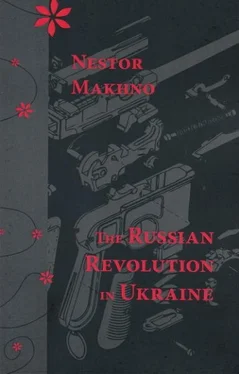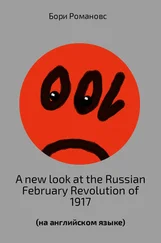I myself have not seen Lev Shneider, but I’ve heard from a number of sources that he has been blabbing away to the haidamaks. We’ll talk about him later. Be careful not to fall into the paws of the Germans. It’s better if you don’t come to Gulyai-Pole. You can’t do anything more for us now: the Germans have occupied Orekhov and Pokrovskoe, and they will probably be in Gulyai-Pole in two or three hours.
We will find you.
For the time being, we careful.
Your faithful B. Veretel’nik April 16, 3 p.m.”
As soon as I finished reading this letter I hurried to Maria Nikiforova and together we ran to Comrade Petrenko. I read both of them the letter of Veretel’nik and told them that it was my opinion that it was too late to go to Gulyai-Pole which must already be occupied by the Germans. As for driving them out of Gulyai-Pole, it was unthinkable with only our two detachments. Moreover, the Germans would be able to prevent us from getting anywhere close to Gulyai-Pole.
If it was true they had occupied the city of Orekhov, it was then probable they were approaching Pologi. And if it was true the Red Guards had abandoned Chaplino to the Germans and evacuated Grishino, then Gulyai-Pole was already well behind the German front.
Whereas Comrades Nikiforova and Petrenko had begun by putting me down, saying I understood nothing of their strategy and didn’t appreciate the combat resources of their detachments, they now hastened to turn their echelons from the Pologi direction to the direction of Volnovakha. They stopped talking about Pologi and Gulyai-Pole.
I asked them: “Why are you in such a hurry? Have you received some bad news about this sector?” M. Nikiforova replied that the Germans had occupied the stations of Pologui and Verkhnij Tokmak and that they had thereby cut off the anarchist detachment of Comrade Mokrousov on the Verkhnij Tokmak — Berdyansk line.
“If you wish,” said M. Nikiforova, “you can sit in my wagon. I am going to give the order to my echelon to continue on in the direction of Volnovakha — Yuzovka.” And she added softly, with a slight smile, excusing herself: “You were totally right to say it was too late to go to Gulyai-Pole. All the approaches are occupied by the Germans.”
However I declined to retreat with M. Nikiforova’s detachment, declaring I would remain there for the time being, especially since Petrenko’s detachment had decided to spend the night there. I was hoping that some of my comrades from Gulyai-Pole would show up. I had, indeed, upon first learning that Gulyai-Pole had been betrayed to the Germans, sent Aleksandr Lepetchenko there with the mission of explaining to the “communards” the direction they must take in their flight and recommended that he accompany them. As for Comrades Veretel’nik, Gorev, Marchenko, Polonskij, Kalashnikov, Petrovskij, Lyutyi, Savva Makhno, S. Shepel, M. Kalinichenko, P. Sokruta, and others, Aleksandr Lepetchenko was to tell them to leave Gulyai-Pole as quickly as possible and head for the Red Front. There they would find me.
During the time that Petrenko’s detachment was at the Tsarevokonstantinovka station, I was able to greet a number of comrades who had remained at Gulyai-Pole up until the arrival of the German and Austro-Hungarian forces, preceded by a reconnaissance squadron of the Central Rada about 40–50 strong. They told me the story of everything that had happened in Gulyai-Pole in the two days following my departure. They had tears in their eyes as they told me about the foul treason of Lev Schneider, a comrade of our Group, and of the Jewish regiment tricked by the gang of traitors.
They also told me about the entry of the German and Austro-Hungarian forces and the detachment of the Central Rada. They told about the local agents of the Central Rada, citizens of Gulyai-Pole, in particular sub-lieutenants A. Volokh, I. Volkov, L. Sakhno-Prikhod’ko (SR), Pidojma, and some others — small fry but vicious — such as Osip Solovej, V. Sharovskij (SR), and the agronomist Dmitrenko. This bunch prepared themselves to receive the hangmen of the Revolution — the Germans and Austro-Hungarians — hoping to prove that they were also killers of the Revolution and all that was best in it.
This crème-de-la-crème of the Ukrainian patriots, the so-called “flower of our people”, were ready to follow the example of the German and Austro-Hungarian soldiers who, leaving their own countries to suffer from hunger and cold, leaving their fathers and mothers, their wives and children, had come here to kill their counterparts. The nationalists, not content with supporting these conscious or unconscious assassins, these destroyers of the people’s revolutionary achievements, wanted to do worse things. They were ready to march at the head of these murderers and arsonists, fight the toilers, and drown them in blood. And all so that their masters, who had traitorously covered themselves with the flag of socialism, would let them keep their gold epaulets as sub-lieutenants and their right to own the land.
These proclaimers of the idea of the occupation of revolutionary territory by the counter-revolutionary German and Austro-Hungarian armies, and the subsequent annihilation of the revolutionary toilers, handed over to the foreign troops as they passed through Gulyai-Pole machine guns, hundreds of rifles, and our cannons!
The commander of the German forces thanked them for their “loyalty”. These odious proclaimers of the idea of occupation, along with others who were in tune with the new counter-revolutionary regime, did not conceal their joy at this compliment from the powerful.
What a disgrace!
And so a desire for vengeance was born in the soil of the revolutionaries. Vengeance against all those who trampled on the toiling population, enslaved, tortured, crushed politically and socially.
No more pity for the enemies of the toilers! No more pity for all those who try to oppose our revolutionary activity! That’s what I told my comrades then and that’s how I acted.
The reader will see how this worked out in the next volumes of my memoirs.
THE ANARCHIST LIBRARY
May 27, 2009

http://theanarchistlibrary.org
Author: Nestor Makhno
Title: The Russian Revolution in Ukraine (March 1917 — April 1918)
Publication date: 1926
Retrieved on March 12th, 2009 from http://www.nestormakhno.info/english/memoirs/book1/index.htm
Published by Black Cat Press, Edmonton 2007. English translation copyright Black Cat Press. The Nestor Makhno Archive has altered some spellings and corrected some typographical errors.
Source: Black Cat Press, 4508 118 Avenue, Edmonton, Alberta, T5H 2J1 CANADA, blackcatpress@shawbiz.ca













